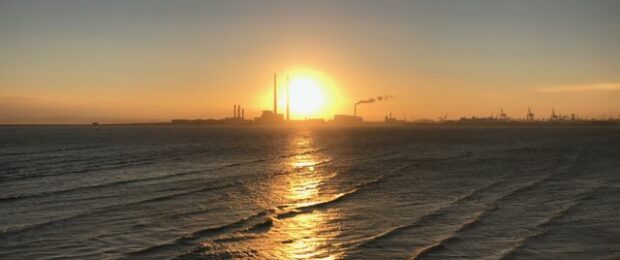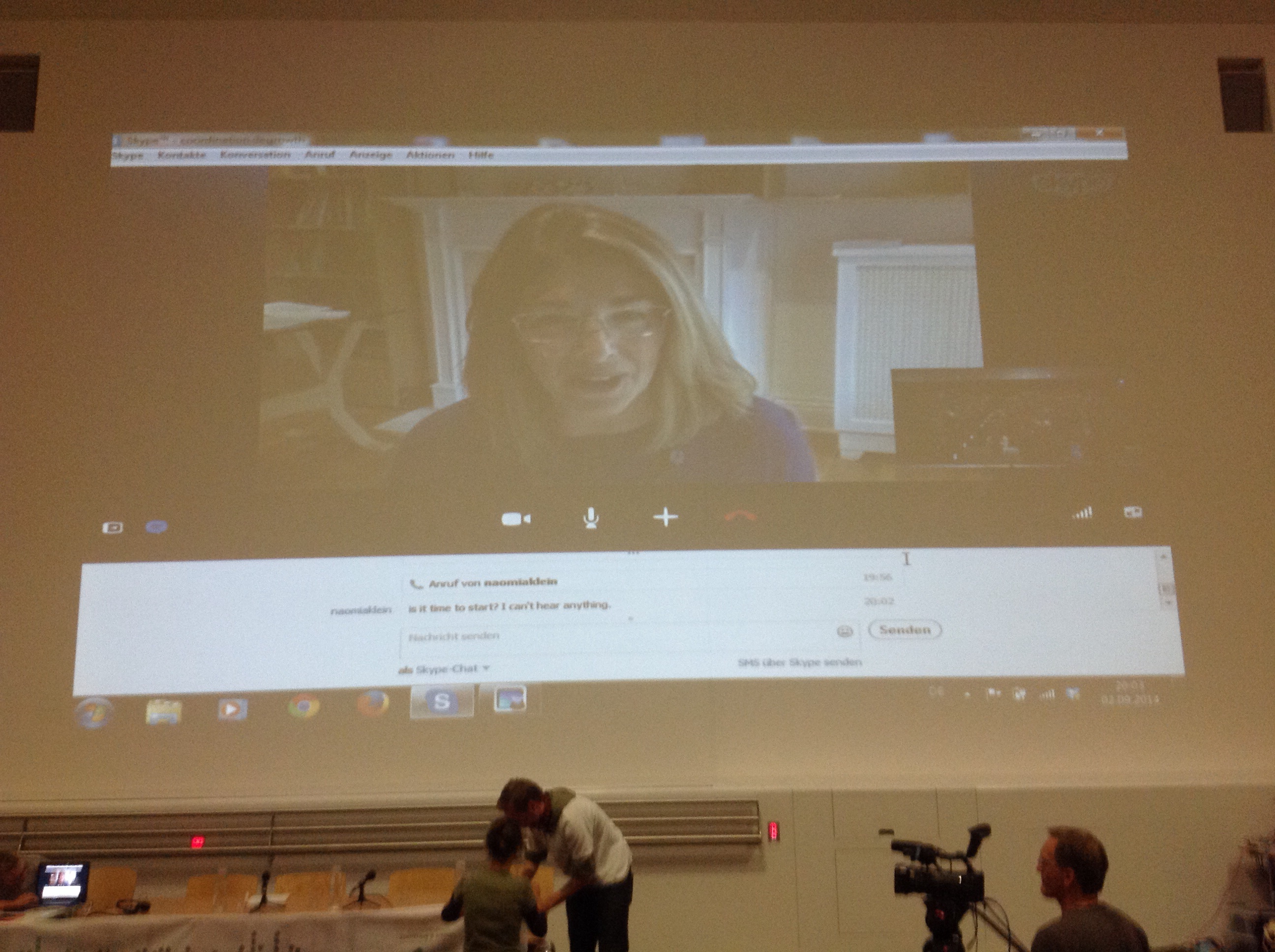“When you told your friends and family you were going to a degrowth gathering, they asked, ‘What is degrowth?’ How did you respond?”
The 2018 degrowUS gathering from September 28-30 2018 in Chicago began with this question. The first day’s thirty-odd attendees wrote their responses on sticky notes as they scraped the last bites of lunch off the dishes the event’s organizers had told them to bring from home.
Friday
It turns out, degrowth is a lot of things: a criticism, a proposal, a hypothesis, a provocation, a conversation, a deceleration, a downscaling, a reimagining, a project, a lens, a movement, a set of practices, an invitation to dream of worlds beyond growth. This is not disagreement about the definition of degrowth; it is evidence of the plurality of diverse meanings this potent word packs.
After some introductions to the weekend summit, anthropologist Susan Paulson skyped in a short talk. One of a tiny group of accomplished scholars studying degrowth at U.S. universities, Susan was a bit disappointed not to have been able to attend the gathering. We were disappointed by her absence too, but her virtual visit set the theme for the whole weekend.
Susan introduced us to the pluriverse, the idea that there is no single truth, no correct cosmovision. For her work at the intersection of degrowth and post-development, the pluriverse means that many different desirable ways of being and thinking about the good life exist simultaneously. She drew on her work in Latin America, uncovering several parallel ideas and movements that present real alternatives to capitalist development: agroecology, the Zapatistas, and buen vivir – the good life.
We heard remotely from
Research & Degrowth founder François Schneider about some of the early history of organizing for décroissance in France. Then Bob Thomson, also via skype, shared some hard lessons learned from trying, but not quite succeeding, to build a movement in Canada from the momentum of the 2012 Degrowth in the Americas conference he co-organized in Montreal.
This first day took place at
Plant Chicago, a long-abandoned meatpacking house that eco-entrepreneurs have transformed into a small-scale, open-source, closed-loop circular economy. We toured the breweries, gardens, and other projects who make treasures from each other’s waste products, and then discussed the divergences between degrowth and the circular economy. Erik Assadourian and John Mulrow helped us think about their potential convergence in a downward
spiral economy that not only closes but also slows and shrinks society’s material cycles.
Some of us stuck around into the evening to participate in an indigo dying workshop over a documentary about the poisonous pollution of the fashion industry. Many of us were exhausted from travel and a long first day.
Saturday
We held our Saturday sessions at the Field Museum. For that we can thank
Alaka Wali, a cultural anthropologist who, in teams of social and natural scientists, collaborates and learns with communities in the Andes and Amazon regions to support efforts to protect their land from extractive industry and destructive development. She was excited to host us on behalf of the Field Museum.
Alaka understands the pluriverse. When someone made the typical argument that some communities do need growth, she qualified that statement: “Not everyone who’s been oppressed wants to be like those who have been oppressing them.” It was Alaka’s attendance at a conference on “Buen vivir and other post-development pathways,” hosted by Susan Paulson’s Center for Latin American Studies at the University of Florida, that made us degrowthers aware of her work.
In the morning, gathering participants gave lightning talks about the destruction caused by the construction industry, the field of industrial ecology, a Chicago time bank, a national campaign for the right to repair our things, and something called embodiment activism. Each one generated lively discussion.
After a long lunch break during which Alaka toured a dozen gathering participants through an exhibit about her work supporting conservation, a panel of potential degrowth allies assembled. This was the American pluriverse within which degrowth is emerging.
Each panelist represented a different movement, initiative, or institution that aligns with degrowth in some way. Every one of them was on point.
Dayton Martindale spoke about how degrowth can provide systemic analysis of the economy for
animal liberation advocates, who tend to focus narrowly on livestock agriculture and other sectors that directly oppress non-human animals.
Alaka represented museums: public institutions that engage people in fun ways with serious issues, perhaps including degrowth. She also spoke of the South American communities with whom she works. “There are places in the world where people think it’s okay to die at forty,” she said, transporting us to a far-off part the pluriverse. “It’s not bad to die.”
Brian Czech came to us from the Center for the Advancement of the Steady-State Economy. While degrowUS is building power with lefty political organizations,
CASSE will continue pushing environmental organizations and government agencies to publicly question, and ultimate reject, economic growth.
Ashik Siddique spoke for the
Ecosocialist group of Democratic Socialists of America, a growing segment of the country’s largest leftist political organization. Briauna Barrera, another of our strong DSA Ecosocialist contingent, eloquently tied her work in San Antonio with the consumer lobby group
Public Citizen to the principles and goals of degrowth.
Mason Herson-Hord told us about the network of
radical municipalist movements called Symbiosis. They are trying to build parallel political power at the level of neighborhoods and cities, fighting not just tyrannical urban growth machines but the “lack of community experience in daily life” – a democratic, bottom-up struggle for justice and conviviality.
And Judy Li represented a network called
Environmentalists of Color, while also mentioning the challenges of bringing up degrowth at her day job in green finance.
The panel revealed a diversity of degrowths, from simple living to going after large institutions with uncivil disobedience. We discussed where the degrowth concept makes sense and where other concepts work better for organizing. That’s why we have a pluriverse.
Then psychologist Tim Kasser gave the gathering’s lively keynote lecture, on his new research showing how alternative indicators can affect policy makers’ decisions. His research on values suggests a theory of change, according to which measuring and prioritizing community and environmental goods can reinforce intrinsic, altruistic values that actively counteract the extrinsic, materialistic values needed for growth.
That evening we had a picnic potluck at a lakefront park. Someone joked that there was a pluriverse of beer options in the backpacks of those who’d brought beverages.
Sunday
The third day was largely self-organized. In the morning we had an “un-conference” on strategizing the degrowth movement: a few participants proposed exercises, workshops, or discussions that they would facilitate and then everyone else joined whichever activity they wanted. There was a group making causal loop diagrams to help strategize for degrowth, another learning about and practicing one-on-one political organizing techniques, and another making a network map of the allied movements surrounding degrowth in the U.S.
Then writer and filmmaker
John de Graaf drew on his 40 years of experience communicating degrowth-related ideas to teach us some techniques and get us thinking about how we might talk and write about degrowth. Like in his work, he mostly told us stories. Which is probably a good strategy for communicating degrowth.
In the afternoon, the folks who’d made it to the end of the weekend – nearly 30 but with some rotation from the original crew – self-organized into working groups to get going on making degrowUS.
I was in the propaganda group. We drew up a zine called “What is Degrowth?” based on the responses from the first day, and made plans for op-eds, videos, graffiti stencils, and other means to disseminate the degrowth revolution to the people who’ve been waiting for it. Other groups planned out toolkits for practicing degrowth, worked on a mission statement, organized internal and external communications, and came up with political education programs.
I want to focus on how degrowUS organizes. We fully embrace a pluriverse of tactics and audiences and ways of presenting and spreading degrowth. There’s lots of “I will” but little of the “we should” that implies grasping for authority.
This is how Anna Ronan, who has taken the lead making our website and promoting the gathering, describes our guidelines to new degrowUS snails:
1. DegrowUS has operated so far as a do-ocracy. If you want to do it, do it! If you think it should be done, do it! If you think it absolutely should not be done, say so nicely and discuss it openly and honestly, but please refer to point 3 before proceeding.
2. Our official role structure is that everyone is President. Feel free to put it on your resume as such.
3. Remember the pluriverse. Just because it won't work everywhere doesn't mean it won't work somewhere.
4. Assume good intentions.
5. You are worth more than your productivity. Please only do what feels natural and affirms your vision of the good life, and don't ask others to take on more than they feel to.
John Mulrow, Stef Funk, Tom Makled, Emma Berman, Anna, and I planned and put on the gathering more or less like this. In Chicago, a fairly youthful crowd of snails brought lots of energy, skills, smarts, and care to degrowUS.
As we evolve and gain momentum and members, we will need come up with a more formalized decision-making structure, at least for certain things. As a few fellow degrowthers
point out, we should rigorously reflect on, experiment with, debate over, and be intentional about strategy and our theories of change. But if you want to talk about degrowth, organize a degrowth event, make degrowth art, or help build our movement in any way, go ahead and do it under the degrowUS banner (which no one has made yet, hint hint).
Steer your spaceship over to our galaxy of the pluriverse. You can be the president of degrowUS too.


